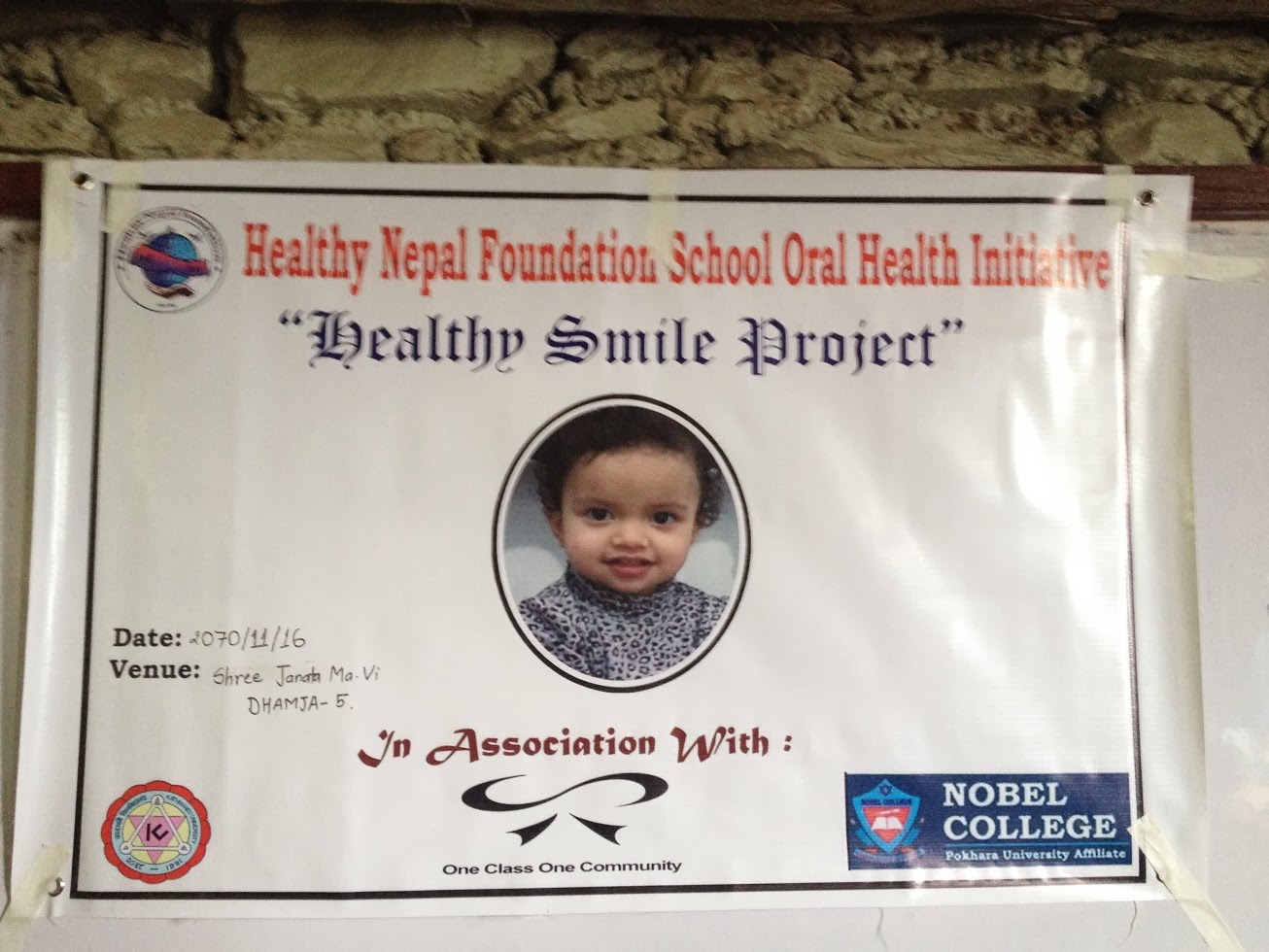Hand washing
is thought to be effective for the prevention of transmission of
Diarrhea
pathogens. However it is not conclusive that hand washing with soap is more
Effective at
reducing contamination with bacteria associated with diarrhea than using
Water only.
How many
times has someone told you: “Go wash your hands before dinner?”
 |
| Image: Shree Dharmodaya Lower secondary School Mirkot-5, Gorkha District |
Why is hand
washing important?
Some microorganism are beneficial to you and
some are harmful. The most common microorganism is bacteria. Microorganisms can
be transmitted from person to person in many ways.
Bacteria
are
a
diverse
group
of
microscopic,
single celled
organisms.
Viruses
are
microscopic
and
infect
cells
using
the
cells
as
hosts
for
reproduction.
Both
bacteria
and
viruses
can
cause
disease
in
humans.
However,
bacteria
and
viruses
exist
in
the
environment
all
around
us
and
most
do
not
harm
people. A
pandemic
is
an
outbreak
of
a
disease
around
the
world.
Scientists
and
health
professionals
are
concerned
about
the
possibility
of
an
H1N1
influenza
(flu)
pandemic.
When
a
flu
pandemic
happens,
people
may
have
little
or
no
immunity,
and
a
vaccine
may
not
exist
for
this
new
flu
virusThe
disease
then
spreads
easily
person‐to‐person
and
may
cause
serious
illness
across
the
country
and
around
the
world
very
quickly.
A
vaccine
is
currently
being
tested
for
the
H1N1
influenza.
According
to
the
Centers
for
Disease
Control
and
Prevention,
the
most
common
method
that
pathogens
are
spread
is
via
the
hands.
Therefore,
proper
hand
hygiene
helps
to
limit
the
spread
of
the
flu
and
other
infectious
diseases,
and
is
the
single
most
effective
way
to
prevent
the
spread
of
disease.
Hand
washing
reduces
diseases
that
are
spread
through
fecal–oral
or
hand‐to‐mouth
transmission,
direct
or
indirect
transmission(i.e.,
close
contact
by
sharing
personal
items),
and
respiratory
or
airborne
transmission
(i.e.,
coughing
or
sneezing).
Micro-organisms
play an important role in all our lives and many are so small they can only be
seen
under a
microscope. Many micro-organisms are helpful to us whilst others can be
harmful; micro-organisms that harm humans tend to be referred to as germs.
These germs can be a bacteria, fungi and
virus.
Germs mainly
enter the home on people, food, in contaminated water or via pets and pests.
Once inside
the home
they can be transferred from person to person or from the source to a person by
direct contact,
or through
indirect contact via a surface and back again. This latter process is often
called cross-contamination.
Cross-contamination
is one of the greatest causes of illness and disease in the world, where a
greater
focus on the
practice of improved and targeted hygiene measures in the home could lead to a
reduction
in
infectious diseases on a global scale. Improved home hygiene strategies
include:
• The need for home hygiene to receive the same
scientific approach generally applied to hospitals
or food
manufacturing
• The recognition that good hygiene is not
about trying to completely rid a home of germs, but
about
effectively implementing good hygiene measures or practices and using them in
the right
place at the
right time
• The distinction in people’s minds about the
difference between removing dirt and hygienic
cleaning
Hand washing
Why is hand
washing so important?
The hands
are one of the greatest ways cross-contamination and cross-infection can occur
in the home.
Hand washing
is therefore the single most important thing you can do to help reduce the
spread of
infections.
Regularly washing your hands properly with antibacterial soap and warm water
can help
protect you,
your family, and others against the risk of infection. If antibacterial soap
and warm water are
not
available, an alcohol-based hand sanitizer should be used.
Why is
surface cleaning so important?
Pathogenic
micro-organisms and fungal spores entering the home can survive on surfaces for
significant
periods of
time and can be transferred to the hands when touched. Germs from hands can
then be
transferred
to other surfaces and other people, leading to infection. To break this chain
of infection,
household
surfaces should be cleaned thoroughly with an antibacterial cleanser or
disinfectant on a
regular
basis, reducing the risk of cross-contamination and lowering the risk of
illness.
Why is food
hygiene so important?
The
micro-organisms that cause food-borne illness can be spread directly onto
chopping boards, utensils,
work tops
and other foods from raw meat and vegetables during food preparation. These
micro-organisms can then spread to other surfaces around the home via your
hands. Once one person is
infected
with food-borne micro-organisms, it’s highly likely that they will pass this
onto others in your
home and
community, particularly if hygiene practice is poor. In order to prevent
cross-contamination,
surfaces and
utensils that are used to make and prepare raw food, particularly poultry and
meat, should
be
thoroughly cleaned with an antibacterial cleanser or disinfectant after
each use.
 |
| Children Involving in Praggmatic Procedure of Handwashing |










